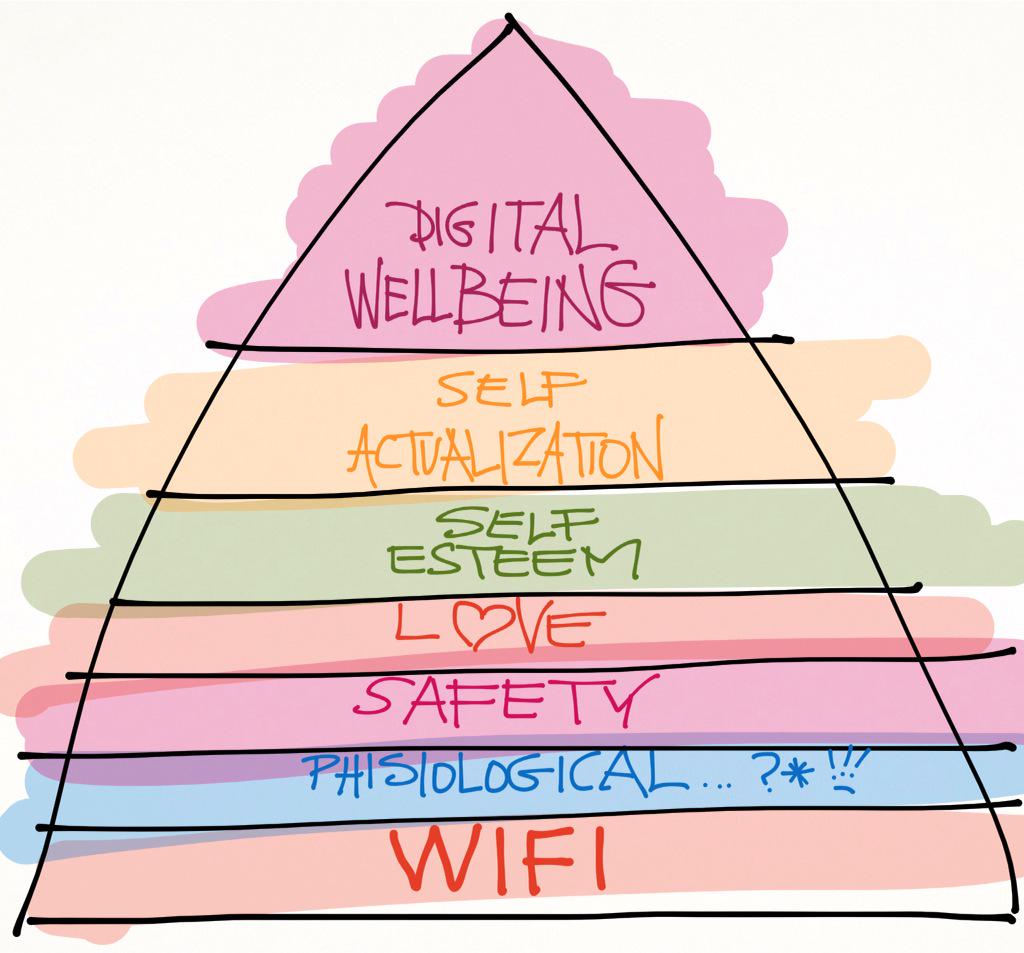
Image: CPD needs heirarchy by @simonrae
In this series of articles, the Educational Technology team will be providing an insight into existing practice using technology for learning and teaching at Falmouth University and also at projects being undertaken within the sector.
The student experience is increasingly mediated through use of technology; timetabling systems, online learning, Student Information Systems, Customer Relationship Management software, mobile devices… all things that staff and students will need to engage with in one form or other to navigate their way through life at University. ‘Digital Wellbeing’ is concerned with exploring and improving these interactions in a personal and social context.
Social media tools are incredibly useful and popular in teaching and learning, but are often built around a Culture of Participation; the more ‘likes’ you get the more influential you are. This in turn exacerbates the Fear Of Missing Out (FOMO) – if you’re not connected then you’re not part of the crowd. Some technologies are designed to help us improve our wellbeing; running trackers, calorie counters, sleep timers all attempt to provide us with feedback based on quantifying our day to day activity, but do they in themselves enhance our wellbeing?
Technology proliferation and a participation culture within the HE sector, can lead to increasing anxiety amongst students and staff, so there is an increasing need for the individual and the institution to recognise and makes steps to mitigate this. JISC/NUS’s Student Experience Benchmarking Tool can be a great conversation starter in this area; note where you are on the scale of First Steps to Outstanding and plan to improve.

Some courses at Falmouth University are addressing this head on by encouraging group discussion around stress and anxiety; there are various signs up inviting people to meditation groups and the University promote both internal wellbeing services and external Talking Therapies like BE|ME.

A recent #LTHEChat that explored Digital Wellbeing asked participants to reflect on technology that enhanced their wellbeing, many focused on social connectivity that isn’t restricted by place/time and the ability to share. In thinking about how technology detracted from this, answers centred around not being able to ‘switch off’, being ‘all over the place’ and a saturation of ‘info’ and ‘spam’ that could be considered digital noise.
So how do we manage our digital wellbeing? Suggestions from the chat were to set time boundaries for checking social media, literally switch off devices and step outside the bubble of your own technology use. It is also important to encourage discussion and development of our digital capabilities and as JISC/NUS suggest, provide space for self-reflection.
Falmouth’s Student Union have identified ‘Mental Health Support’ in their Top10 issues for 2015/16 and have also established a ’Green Living’ project and ‘Digital Detox Series’. These events focus on removing oneself from the day to day technology and engage in outdoor making and horticultural activities as a means to improve wellbeing.

The series was organised by a recent graduate who I had the opportunity to ask about the concept of Digital Wellbeing. He talked about access to the internet, movies and online games as “another layer of insulation from the outside world, a further excuse to stay indoors.” and “a constant stream of stimulation, rendering anything outside of a virtual world boring.” He acknowledged the benefits of online learning and video/audio chats, but said that above all the means of technology to play music was one thing they couldn’t be without.
I also talked to a member of academic staff, who saw the benefits of technology in making you feel connected and providing avenues of accessibility, which chimes with the #LTHEchat. She also mentioned the negative impacts that mobile technology can have on our physical health, such as carrying the items, using the items incorrectly and sharing workstations adding “Right now, my laptop is on my knee and I am looking down at the screen. That can lead to a form of whiplash but in slow motion – accreting over the years.”
As working online is such a part of our daily lives, we’re often using the internet as a distraction instead of taking time away from the screen. A common theme was that access to online stuff can “suck you in”, so techniques that break tasks up such as Pomodoro can be useful. Our staff member has introduced “an early morning switch off policy – going for a walk/run instead…I feel better for it”. They suggested that less or better use of email could aid wellbeing, but although this has been discussed over a number of years, it remains hard to implement.
It’s fantastic to see this concern being raised at national and institutional level and the JISC/NUS tool leaves us with an important consideration regarding implementation:
“Most of the ‘outstanding’ practices involve staff and students working in partnership. The partnership needs to be meaningful in order to work, which means that both groups must listen, recognise each others’ skills and resources, and be willing to compromise. “